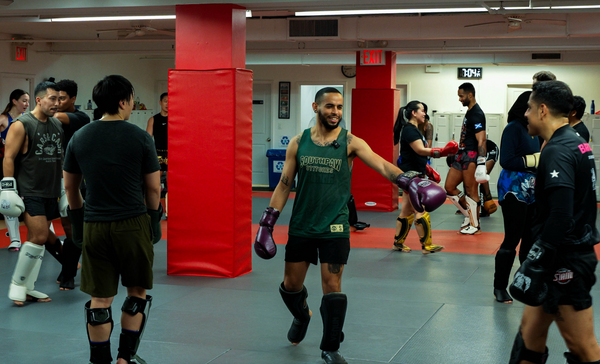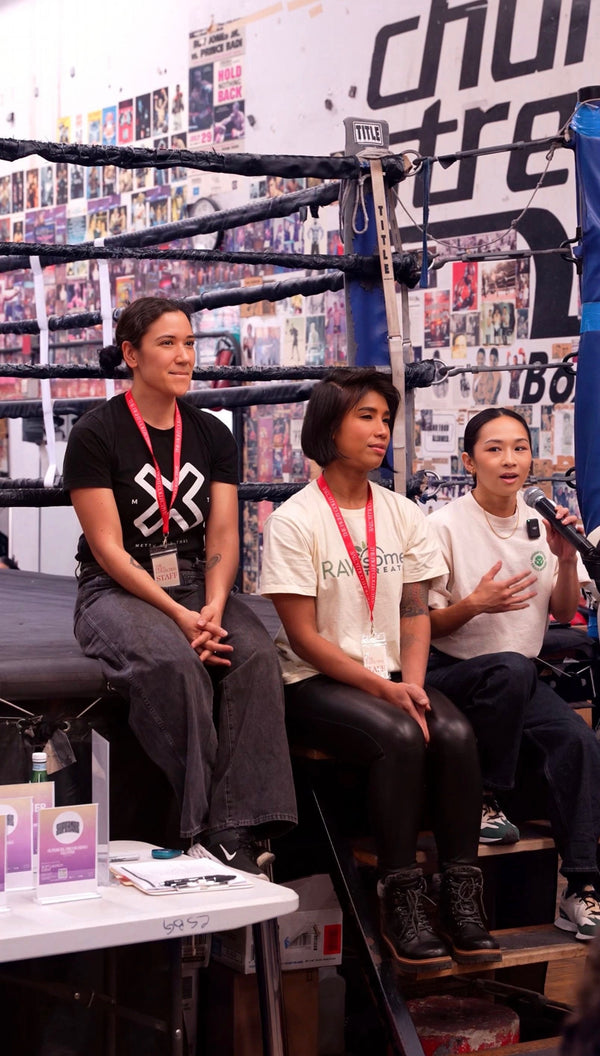Love Our People: Chef Francis of Bad For Business

Food is a universal language of love. Food is the center piece to many of our gatherings, whether it be in mourning or in celebration. The smell of a specific dish can take us back 20 years and it has the power to unlock the nostalgia of an entire chapter of our lives. We may not remember exactly what was served but we remember how it made us feel.
In many of our cultures, it’s an unspoken etiquette to always return borrowed tupperware back full with food. Maybe this exchange etiquette is how our ancestors took care of one another. How we kept us fed through war and poverty. In Korean culture, the elderly many times greet us with “have you eaten today?”. If you have a full stomach, you are surviving ... you are well.
When I sat down to talk to Chef Francis, we connected on being immigrant kids, growing up in Queens, and the shared regret and wish for wishing we had appreciated our own cultures, history, and cuisines a bit more in our adolescence.
In our conversation, Francis shares with us his unconventional route in the culinary field, why he decided to leave the traditional “fine dining” track, and the story and vision behind his pop-up named “Bad for Business.”
Hope you enjoy this conversation and story as much as I loved having it.
-Hannah

Tell us your story
I grew up in Queens. I immigrated when I was 9 from the Philippines and have lived all over Queens and now live in Jackson Heights.
Prior to being in the professional culinary field in the restaurant industry, I always knew that food was going to be an important part of my life. My family shared a lot of family meals together in the Philippines but food changed when I came to the states. Food here is just a part of your day … you have your school meal, lunch meal, dinner meal but it wasn’t a celebration like it is in the Philippines. Back in the Philippines, a meal meant a table packed with food and cousins gathered around it. In my journey to becoming a chef and business owner, I wanted to bring back that sense of community… the celebration over a meal.
I had initially envisioned climbing up the culinary ladder … fine dining, european chefs, going to a prestigious school and getting my education and background. That changed for me as I continued in the industry. I didn’t like the idea of going to fine dining and where you have to dress up and pay loads of money to eat mainly European foods.
Since I always grew up eating Filipino food, I didn’t necessarily invest a lot of time actually learning about the cuisine itself. It was in college where I tried to find my place in the Filipino heritage. I started learning more about myself and my culture. I lost my language and I am a little bit ashamed at times but I’m trying to get in touch with my culture through food.
With Filipino food, our history is mixed up with colonization by Spain and Americanization of our culture in our last 100 years. There is a lost gap of what is truly Filipino food. I cook based on my memory of how I ate, the flavors I remember, and how I felt. Hopefully I’m translating my own flavors without claiming to be authentic. “What’s authentic” is a whole another cultural conversation.
Filipino food is diverse. There are lots of distinctions between sour and salty flavors. Lots of regional different Cooking techniques brazing, noodles, rice, vegetables. It’s a melting pot. Given our history itself 300+ influence years from Spain and Portugal. Then there is a lot of influence from China… lots of American influence. It’s like we took in what was shown to us and created our own food identity. Regional cooking with salty, sweet, sour, melts.

Your curated pop-up is called Bad For Business. What is the story behind your business name?
Bad for Business came into play 3 years ago while I was working in hospitality. Certain standards have to be met in the food and hospitality business. If you want people to keep coming back you need to have great food, great service.
You can lose your own sense of value or sense of self if you’re constantly looking to uphold people’s desires. I want to keep cooking for myself and to keep cooking for my people. I want to take risks. I don’t care if you don’t like it. It’ll be bad for my business if I’m cooking to please you. Another take is the anti-normal sense of hospitality. When you think about business you have to keep your profits, you don’t care for your employees, their mental health… I care about the people first or making a profit.
For the future I want to continue to cook the food that I want. With a sense of consciousness. Whether it be through donations or collaborating people.
I do a pop up whenever I can. I also do home cooking and deliver to people. I can’t say where I’ll be. I don’t want to limit myself to one track or entity. I want to have freedom and to do whatever I want and cook when I want.
I’m thankful that people who come to my street BBQ pop-up. It’s a good time to educate, to converse, and it's a gathering. I have ideas to make the pop-up bigger… with a portable karaoke machine... and have ppl have a good time and something positive.

What does the Love Our People message mean to you?
The “Love our people like you love our food” message speaks to me as a chef to find that love with myself. It starts with the love of yourself. We have to remember the people behind the culture we love. You like to eat tacos but you don’t care about the people growing your food. You drink your tequila but you don’t care about the people who are being deported. We can't like one part of a culture and not give a shit about its people.





